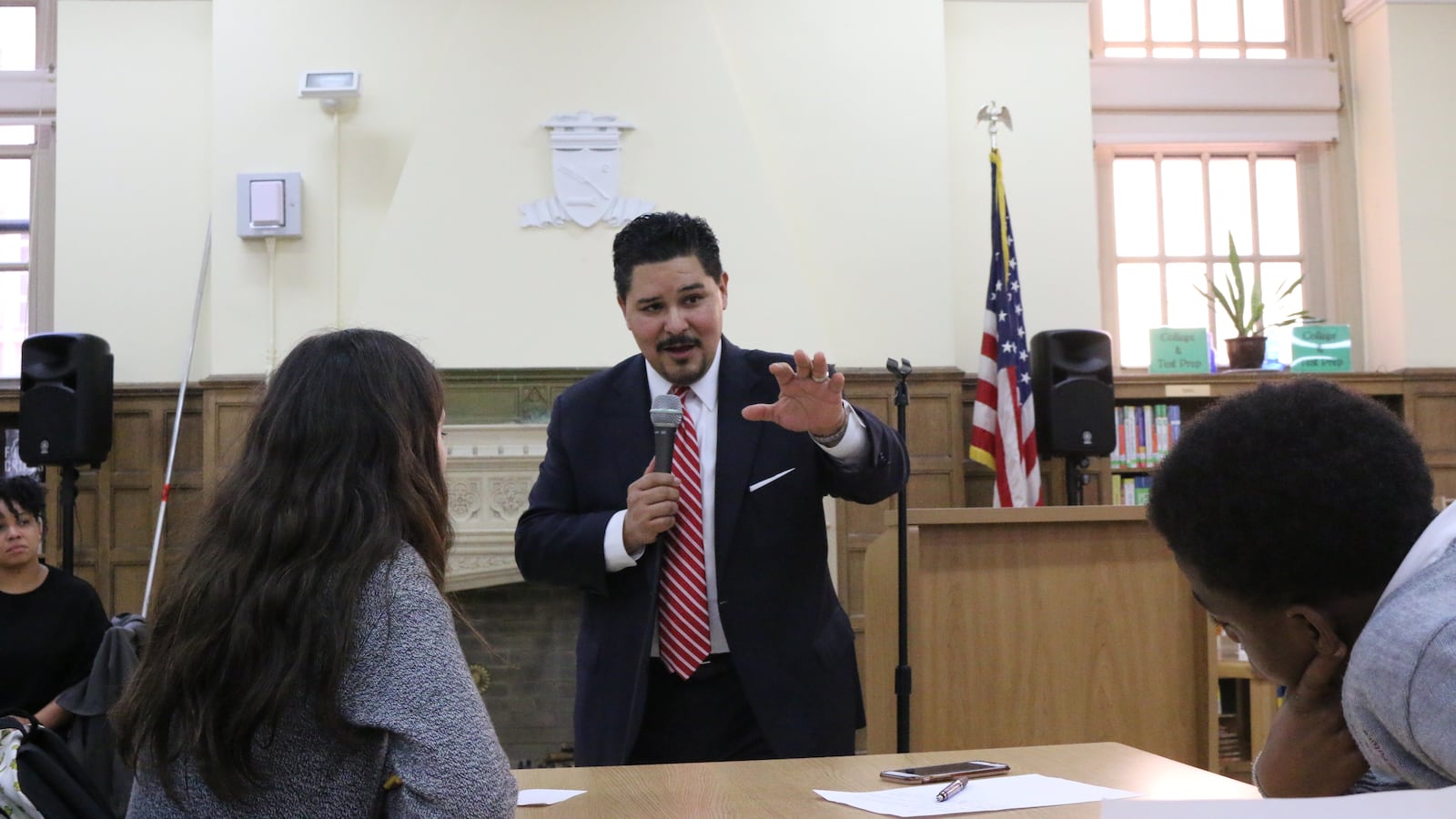In his first town hall meetings with students and parents, schools Chancellor Richard Carranza said Monday he would be a “provocateur” and ask tough questions of the mayor — and promised school communities would play an important role in the policy process.
“While he may be the mayor I’m the chancellor and he’s giving me the opportunity to lead in this organization, not as a top down leader, but as a consensus builder, and in some cases a provocateur,” Carranza told parents Monday night.
This was the latest time in his short tenure that Carranza has been willing to stake out some independence from his boss, Mayor Bill de Blasio. In an interview with Chalkbeat last week, he raised questions about whether the mayor’s high profile and expensive turnaround program has a clear “theory of action.”
On Monday evening, Carranza took questions from parents and students during back-to-back town halls at Brooklyn Technical High School. Community members from across the city quizzed him about school safety, segregation, special education, and standardized testing. But in contrast to a school safety town hall with Mayor de Blasio last month, the tone was friendly, and Carranza focused mostly on introducing himself and speaking in broad strokes about his philosophy.
He took his time laying out his biography as the son of a sheet-metal worker and hairdresser, explaining that he learned English in a public school (his parents spoke Spanish at home).
“I am you,” Carranza told a group of several dozen students. “You are going to have a place at the table when decisions are made.”
As a start, the chancellor announced he would launch a “student advisory” to help address complaints he said he has heard about school food options.
But students quickly pushed past concerns about school food — an issue the chancellor had raised on his own — asking about disparities in student discipline, segregation, and special education.
Robina Afzal, a student at the Urban Assembly School for Criminal Justice, asked how Carranza would respond to disproportionate discipline practices, including among students of color. “Historically marginalized students are punished more severely than their white peers,” she said.
Carranza replied that he takes the issue seriously and plans to roll out implicit bias training for teachers and administrators. “We all have an implicit bias — all of us,” he said. “If I know what my bias is I can do something about it.”
After the discussion, Afzal said she appreciated the chancellor’s answer, even if she’s a little skeptical of the trainings. “That’s the right start,” she said, “but I don’t think it’s going to solve the problem.”
Carranza then addressed a group of parents, some of whom had been handpicked by their schools’ principal. (The education department did not widely publicize the event beforehand. And unlike the student version less than an hour earlier, parent questions were submitted in writing and selected by department officials.)
Coming off his first round of school visits since taking the job, Carranza said it’s clear there are stark inequities in city schools. “Not everyone has an equitable access to all the educational opportunities in our school system,” he said. “We need to talk about that.”
The chancellor addressed concerns about school safety, noting he is scheduled to meet with New York Police Department Commissioner James O’Neill Tuesday. He said the city is conducting a review of school buildings to figure out how they can be more secure. And he doesn’t support arming teachers: “I think it’s a misguided idea that feels good.”
Asked about special education, Carranza said he is committed to inclusion and thinks of it as a “service” as opposed to a “program” that students attend in segregated settings.
At one point, unprompted by the audience, the chancellor also briefly appeared to take a jab at charter schools, noting that he had seen lots of examples of “joyful learning” during his inaugural round of school visits. He appeared to contrast that with more strict learning environments in an apparent reference tod charter schools. “If you’re part of the reform agenda you may not understand this,” he said, before adding: “No one says you have to be unhappy to learn.”
His responses generally earned praise from parents, who applauded and nodded in agreement through many of his answers.
“His experiences seem to mesh with the experiences many children in New York have or will have — he can empathize,” said Celia Green, whose children have attended city’s schools since 1994.
Green, who has taken on various parent-leadership roles and has a special needs child, said she’s eager to see how Carranza addresses the special education system. Problems have included student learning plans that aren’t accessible to parents who have difficulty speaking English and shortages of services such as guidance counselors and therapists, she said.
“It’s still going to be a ‘wait-and-see,’” Green said, referring to her judgment of Carranza. “What he did answer, he answered well.”


